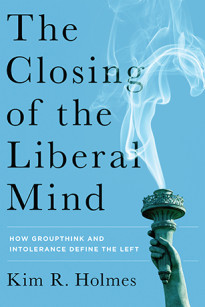Ideas have consequences. And for Kim Holmes, former U.S. Assistant Secretary of State and current distinguished fellow at the Heritage Foundation, the illiberal ideas of today’s postmodern left have been particularly pernicious and widespread.
It is this subject–ideas and their consequences–that is at the heart of his new book, The Closing of the Liberal Mind.
During an in-depth conversation on the book with Mr. Holmes in Encounter Books’ offices in New York, we had the opportunity to explore the core assertions underlying postmodern leftism. Holmes swiftly debunked such ideas as not only logically incoherent but downright fraudulent.
Below is Holmes’ argument that the most pervasive ideological force in America today is bankrupt:
Relativism is manifested in the postmodern left mainly in identity politics, where a person’s identity is, whether it’s sexual or transgender or about gay marriage or whatever the issue is–it is thoroughly the property of the individual, and only they have a right to say who they are. And you–this is where the issue of equality comes in–everybody else, must conform to that individual point of view.
So on the one hand it’s radically individualistic. That is what makes it postmodern. But on the other hand, it is the old New Left agenda, which is radical egalitarianism. It is defining this new radical individualism as a new kind of equality.
So if I don’t conform or agree to a person’s belief that same-sex marriage is the same thing as traditional marriage, or if I don’t believe and accept–I don’t mean tolerate, I mean accept the fact that a…transgendered man is[n’t] a woman–I am now out of step with the new morality. And I don’t just offend that one person’s basic rights according to them. I am also somehow denying that class of people their equality. That in a nutshell is the postmodern left.
Tolerance becomes a gateway for intolerance because if you don't accept their point of view in the public square, you are the one that's intolerant. And they have a right to be intolerant towards you.
It is very slippery, it is very confusing and for conservatives who were raised in the natural law tradition or even just the old-fashioned progressivism, all the categories of individual versus society, authority versus freedom is turned completely inside out. And if you don’t know what it is that they’re doing and saying, it is so easy to get confused. And if you get confused next thing you know you’re using their language.
For example, it’s about “Civil rights.” It’s about “discrimination.” It’s about their “rights,” and you are denying them their rights and you have no right to your opinion. And so tolerance becomes really a gateway for intolerance because if you don’t accept their point of view in the public square, you’re the one that’s intolerant. And they have a right to be intolerant towards you. And it’s this kind of confusing situation which I think philosophically is incoherent, but politically it is powerful because it’s slippery, you can adapt it to anything and also it’s based upon a fraudulent claim.
The fraudulent claim is that really they’re just making a relativistic position: “All morality is gone. My morality is as good as yours.” But that’s not what they really are arguing. They are saying “My morality is right and yours is wrong. Mine is normal now and yours is abnormal.” So it’s based upon a fraud, a fraudulent claim.
But, in the popular culture that fraudulent claim is completely…not seen. It is not known. And that is why I wrote the book: The Closing of the Liberal Mind was to expose this fraud.
During our interview, which you can listen to in full below, we also had the chance to discuss America’s transition to postmodern leftism, the logical inconsistencies of relativism and identity politics, the postmodern left’s attack on the law and free speech, and what Americans can do to fight back against the regressive ideology that is turning the nation’s most cherished principles on their head.
Photo credit: Believe Anything by Barbara Kruger at Hirshhorn, Washington, DC (Steve Rhodes)

